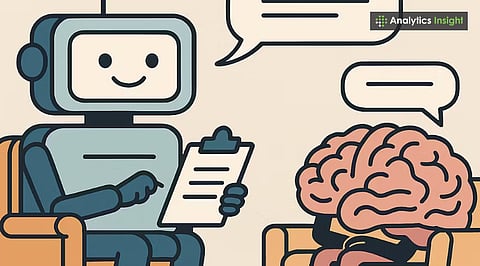

AI chatbots provide users with accessible, cheap, and available mental health support at all hours of the day.
Tools such as Woebot, Wysa, and Replika can help with stress management, anxiety, and emotional control.
AI chatbots should complement professional care, but cannot fully substitute for human therapists or empathy.
Mental health issues have become a global concern today. Many suffering from depression still struggle to access professional help. Long waiting times, high costs, and stigma often discourage those seeking therapy.
This is where AI chatbots show their usefulness by providing support, coping strategies, and mutual guidance when needed. These chatbots are designed to support human therapists, transforming the way individuals approach mental well-being.
AI chatbots such as Woebot, Wysa, Replika, and Youper simulate human interaction and offer emotional support. They provide users with a safe place to express their thoughts, track moods, or implement an exercise for their mental health.
These chatbots utilize cognitive behavioral therapy (CBT), which aims to help users identify unhelpful patterns and develop functional coping strategies to address them.
The convenience of these AI chatbots for mental health makes them attractive. They are available at any time, relatively inexpensive, and do not require making appointments. For people who are perhaps shy or intimidated about sitting down with a counselor, these chatbots may be their comfortable first step.
With its CBT foundation, Woebot facilitates daily check-ins in which negative thoughts are reframed and anxiety is alleviated. People often find it helpful just to be aware of their feelings through the assistance of this model.
Wysa offers conversations driven by AI, while also providing the opportunity for actual coaching. The chatbot keeps track of their moods, guides people to mindfulness, and walks them through structured programs for stress or depression.
Replika is a virtual companion that provides casual support to combat loneliness and negative self-reflection. The chatbot does not offer therapy, but it soothes many users who need someone easygoing to talk with.
Youper assists users through self-directed care methods that track emotional patterns. This allows the app to suggest potential exercises and encourage daily emotional check-ins, keeping users informed about their current status.
These AI models cater to a spectrum of needs in the mental health space, ranging from light to heavy, from emotional check-ins to more comprehensive mental health routines.
AI mental health support offers several benefits, including legitimate access, high privacy, and low cost. Chatbots help plug gaps in mental health care and nurture habits for emotional well-being. For those who live in remote areas or have tight schedules, these tools are essential first steps in getting professional help.
These chatbots cannot empathize with or journey through the complex emotional circumstances of individuals. Instead, users are ferried to hotline numbers or professional mental health care amid crises.
Another concern is that conversations are stored and processed for development purposes: a downside of the system. Hence, a user must read the privacy policy carefully before divulging much information.
The future is likely to be built through a hybrid approach. AI chatbots handle daily check-ins, mood tracking, and other routine support, allowing human therapists to provide in-depth guidance. This could increase access to mental health services, reduce costs, and provide consistent long-term support.
AI chatbots for mental health are tools, not substitutes for human connection. They help people reflect, build coping strategies, and take the first step toward seeking professional help if needed.
Relying on chatbots for mental health support comes with uncertainty regarding their actual capabilities and limitations. While these AI models can address everyday issues such as stress, anxiety, and self-reflection, their positive impact on mental health can be significant when used appropriately. They give easier access to support, reduce intimidating barriers, and empower users to take an active role in maintaining their emotional well-being.
However, it is important not to rely entirely on artificial intelligence for mental health care, as these tools have their limitations. In severe cases or urgent situations, seeking help from a qualified expert is strongly recommended.
